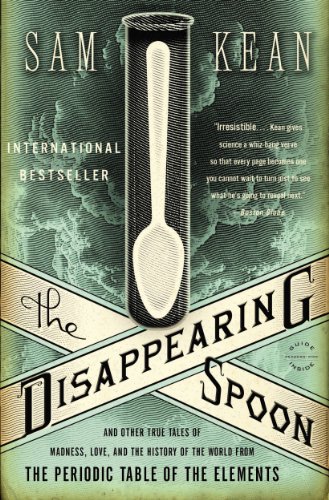Those with a basic grounding in science and history who also have a curious streak and love a great anecdote will thoroughly enjoy these fascinating, amusing books by Sam Kean.
 The Disappearing Spoon: And Other True Tales of Madness, Love, and the History of the World from the Periodic Table of the Elements (4.5/5 stars, currently priced at $7.99)
The Disappearing Spoon: And Other True Tales of Madness, Love, and the History of the World from the Periodic Table of the Elements (4.5/5 stars, currently priced at $7.99)
The Periodic Table is one of man’s crowning scientific achievements. But it’s also a treasure trove of stories of passion, adventure, betrayal, and obsession. The infectious tales and astounding details in THE DISAPPEARING SPOON follow carbon, neon, silicon, and gold as they play out their parts in human history, finance, mythology, war, the arts, poison, and the lives of the (frequently) mad scientists who discovered them.
We learn that Marie Curie used to provoke jealousy in colleagues’ wives when she’d invite them into closets to see her glow-in-the-dark experiments. And that Lewis and Clark swallowed mercury capsules across the country and their campsites are still detectable by the poison in the ground. Why did Gandhi hate iodine? Why did the Japanese kill Godzilla with missiles made of cadmium? And why did tellurium lead to the most bizarre gold rush in history?
From the Big Bang to the end of time, it’s all in THE DISAPPEARING SPOON.
From Publishers Weekly:
Science magazine reporter Kean views the periodic table as one of the great achievements of humankind, “an anthropological marvel,” full of stories about our connection with the physical world. Funny, even chilling tales are associated with each element, and Kean relates many. The title refers to gallium (Ga, 31), which melts at 84 [degrees Fahrenheit], prompting a practical joke among “chemical cognoscenti”: shape gallium into spoons, “serve them with tea, and watch as your guests recoil when their Earl Grey ˜eats™ their utensils.” Along with Dmitri Mendeleyev, the father of the periodic table, Kean is in his element as he presents a parade of entertaining anecdotes about scientists (mad and otherwise) while covering such topics as thallium (Tl, 81) poisoning, the invention of the silicon (Si, 14) transistor, and how the ruthenium (Ru, 44) fountain pen point made millions for the Parker company. With a constant flow of fun facts bubbling to the surface, Kean writes with wit, flair, and authority in a debut that will delight even general readers.
Copyright © Reed Business Information, a division of Reed Elsevier Inc. All rights reserved.
The Violinist’s Thumb: And Other Lost Tales of Love, War, and Genius, as Written by Our Genetic Code (4.5/5 stars, currently priced at $9.99)
In The Disappearing Spoon, bestselling author Sam Kean unlocked the mysteries of the periodic table. In THE VIOLINIST’S THUMB, he explores the wonders of the magical building block of life: DNA.
There are genes to explain crazy cat ladies, why other people have no fingerprints, and why some people survive nuclear bombs. Genes illuminate everything from JFK’s bronze skin (it wasn’t a tan) to Einstein’s genius. They prove that Neanderthals and humans bred thousands of years more recently than any of us would feel comfortable thinking. They can even allow some people, because of the exceptional flexibility of their thumbs and fingers, to become truly singular violinists.
Kean’s vibrant storytelling once again makes science entertaining, explaining human history and whimsy while showing how DNA will influence our species’ future.
Named one of Entertainment Weekly’s Best Books of 2012
“Kean’s accessible genetic overview, written for the layman, is often as simple and elegant as a double helix.” — Keith Staskiewicz, Entertainment Weekly
“Science is made fun whenever best-selling author Kean…is narrating.” — Susannah Cahalan, New York Post
“Kean’s real knack is for digging up strange details most textbooks leave out….More than an assortment of trivia, the book is an engaging history.” — Allison Bohac, Science News
“As he did in his debut bestseller, The Disappearing Spoon, Sam Kean educates readers about a facet of science with wonderfully witty prose and enthralling anecdotes….Kean’s thoughtful, humorous book is a joy to read.” — Publishers Weekly (Starred Review)

